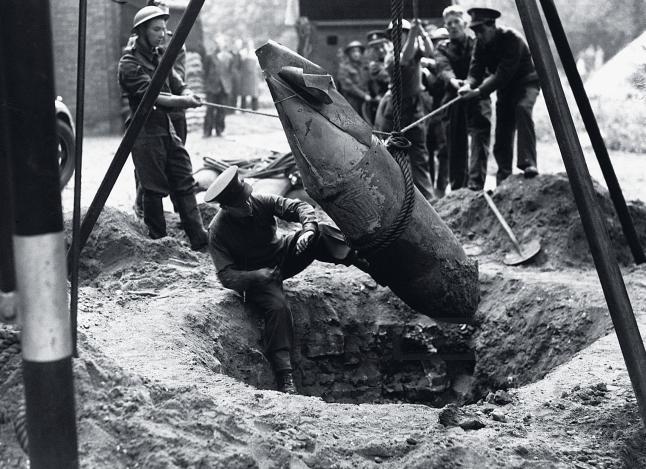Wen | Guo Yemin
Churchill later lamented, "At that time, we could not see any other way out than to sit back and watch the capital completely destroyed." Fortunately, the inhabitants of London and all of England withstood all the blows they had suffered and held out until the day of victory in the Second World War. For six years, Hitler's army was unable to cross the English Channel, so German bombing and missile attacks became the intuitive feeling of the British people about the horrors of war - and in the English-speaking countries of the world, only Britain, not the United States, Canada, Australia and even New Zealand, had such a unique experience.
This will undoubtedly become a source of inspiration for writers. For example, the British writer Elizabeth Bowen (1899-1973) wrote a novel set in the London air raid, entitled "Japan and China". The heroine of the book, a middle-aged woman from middle-class background, falls in love with a British officer who was wounded in the Dunkirk evacuation, but he is a spy for Germany, and finally jumps out of the house under the pursuit of British detectives. Some of the plots seem reminiscent of the famous World War II film "The Eagle Over London" filmed in Italy. Intriguingly, in Elizabeth Bowen's writings, the main threat came not from German bombers, but from people, all sorts of abominable people.

Lieutenant Davis of the British Bomb Disposal Unit Davies) is carefully handling a 1,200-pound delayed bomb on the streets of London
In English literature, the classic work reflecting the Second World War is Evelyn Waugh's Sword of Honor trilogy, which includes three novels: The Armed Man (1952), The Officer and the Gentleman (1955) and The Unconditional Surrender (1961). Although it is named "Sword of Honor", its content is disillusionment with honor. In the words of a literary critic, "the author records the decline and demise of an epoch, with a skill unmatched, and a depth which one has not previously found in him." For example, the second book of The Sword of Honor, Officers and Gentlemen, begins with a depiction of London being hit by a fierce air raid by German planes overnight, while the gentlemen and officers in the club were drinking and having fun as usual. Because of this, The Sword of Honor became the pinnacle of Evelyn Waugh's satirical art.
On the face of it, though, world war II doesn't seem to have had as much of an impact on English literature as the last. There are some poems that directly reflect the war, there are few novels, there are not many memoirs (of course, Churchill, who won the Nobel Prize in Literature for his "Memoirs of World War II"), and there are no excellent scripts, but there have been more performances in movies.
But on the other hand, English literature inadvertently left its mark on the Battle of Britain. This can still be seen even in George Orwell's greatest work, Nineteen Eighty-Four. The title of the book comes from the inversion of numbers in the author's creative era (1948). At that time, the impression of wartime London still remains firmly in Orwell's memory. At the beginning of the novel, the protagonist Winston Smith watches a newsreel that sinks a refugee ship. The prototype of this event is taking place in the "Battle of Britain". On September 27, 1940, a "wolf pack" cruising in the Atlantic Ocean sank a British cruise ship carrying 90 children and 90 accompanying personnel bound for Canada. Nearly 300 passengers and crew members were killed, and only 7 children survived. As in 1984, the passenger ships in both incidents were defenseless, and children were the main victims.
In fact, London, the main city of Oceania's "Airborne Field No. 1" in "Nineteen Eighty-Four", can be found in many places during the Battle of Britain. In this rubble-filled city, rockets often arrive unexpectedly. This is reminiscent of the bombs dropped by German bombers during World War II. And hard life is even more the same as in wartime. The real-life George Orwell complained that "housing conditions are extremely poor, and food, while not really insufficient, is unbearablely monotonous." Cigarettes, beer and unpaid foods like vegetables are ridiculously expensive, and lining rationings are becoming increasingly strained. And Winston Smith in the novel laments: "The house is crumbling, the bread is black, tea leaves have become scarce, coffee tastes dirty, cigarettes are undersupplied... Lack of comfort, dust everywhere, shortage of supplies, lengthy winters, slimy socks, never-open elevators, cold water, shoddy cigarettes scattered, surprisingly unpalatable food..."
George Orwell during the BBC's work
It can be seen from this that this life-and-death struggle between the British people and the aggressors of Nazi Germany has penetrated deep into the national consciousness of the Generation of Great Britain. As Angus Wilson put it in the preface to The Elizabeth Bowen Novels, "When the history of British civilization is looked back at as a peculiar and glorious manifestation of the human spirit, London under air raids must have a very important place in this history—more important than the war itself, and more important than the postwar social and political ups and downs." It goes down in history like the trenches of the same war, and is a special manifestation of the british behavior and feelings. ”